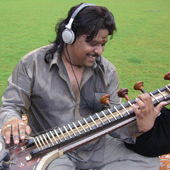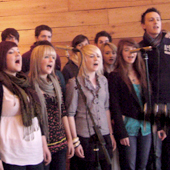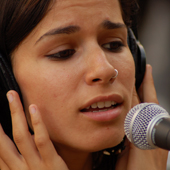|
The term World Music has been around for a while, usually
used to denote a foreign, ethnic or generally non-traditional (to western ears) sound. The small independent label Putumayo
World Music has striven to bring “world music” from Brazil, Ireland, India, the Caribbean, etc. to a wider audience
in the same way that Alan Lomax and others "discovered" country blues
and traditional American roots music hiding in our own backyard. The recording of roots
musicians who made their living as janitors, hairdressers and farm hands in rural America showed us that the fabric of
our culture was deeper and richer than just the commercially successful work of Hank Williams, Bing Crosby, and Louis Armstrong.
Occasionally, western musicians have introduced an international sound and blended it in to enhance their palette. Paul Simon, for example has pioneered the incorporation of South African, South American,
and Latin American music and rhythms into his compositions – with outstanding results.
Musicologist Mark Johnson and his team have now expanded and in some senses redefined
the meaning of world music. All of the songs on their album “Playing for Change” have multiple artists playing
in their native countries, on native instruments. The producers traveled with
a recording and film crew throughout the world (they covered five continents) and invited musicians of diverse cultures to
record the same tunes, introducing their unique styles and interpretations. Since
the recordings were done while playing back the tracks of their fellow musicians and over dubbing as if they were in a studio,
they were truly playing together in the same key and tempo, providing rich harmonies and texture. Fortunately the release includes both a CD and a DVD so we can put faces to the sounds and since the recordings
were all done outside, we are treated to an international travelogue. The songs
on the DVD are visually layered; as each song unfolds we are introduced to the players individually and through split screens
as one, despite the thousands of miles and oceans that physically separate them.

|
| Rjhesh Vaidhya |
|
 |
|
|
|
 |
|

|
| Omagh, N. Ireland Community Choir |
With a few exceptions including Bono, Bob Marley, and Keb Mo, chances are you’ve
never heard of most of the 100+musicians on Playing for Change, but each brings both talent and incredible spirit to the project. You’ll probably recognize many of the tunes however, including the great R&B
classics Stand By Me and A Change Is Gonna Come, several timeless Reggae standards such as One Love, War/No More Trouble,
Keb Mo’s Don’t Worry and Tracy Chapman’s Talkin’ Bout a Revolution. While
the music may be familiar, the arrangements introduce lots of surprises. Nepalese
tabla player, Surendra Shresta provides the back beat to One Love for example. He
doesn’t seem phased by the incongruous pairing of cultures and music – during an interview he simply comments,
“Through music we can get enlightenment.”
The effect is not simply broadening the horizons of appreciation for different
cultures. Through the common language of music, Playing for Change is, in the words of Keb Mo, “making
the world a better place”. The theme is familiar now, as the new Obama
administration is demonstrating that, “Yes, We Can.” When the Playing
for Change team visited Omagh, Northern Ireland, they met and recorded the community youth choir in a truly inspiring rendition
of Love Rescue Me. The Choir was formed in 1988 to help heal and unite Catholic and Protestant constituents of the community
following a terrorist bombing that killed 29 and injured more than 200. In addition
to making a musical statement, Playing for Change has emerged into an on-going foundation, and is building music schools for
the next generation world musicians.
Click here for interview with Mark Johnson and sample video (One Love)

|
| Tula |
|
 |
|
|
|

